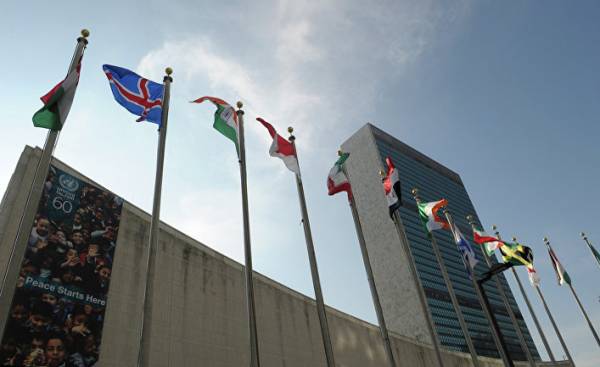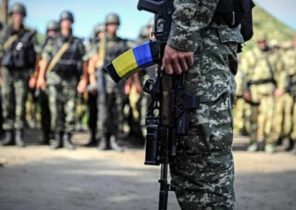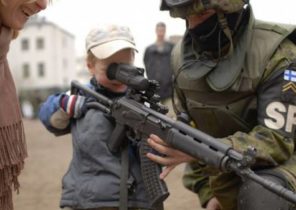
“The problem cannot be solved at the same level at which it originated. We need to rise above this problem up to the next level.”
Albert Einstein
Before we talk about the main, will relate to non-substantive from the point of view of the objectives of this article. A few words about the systemic crisis, which manifests itself today in politics, economy, culture, at different levels and in different parts of the world. To list its features would be to repeat what has been said. However, according to the law of the genre, you need to call the most important of them.
The nearest one in the eyes — the crisis of the EU and ideas about its future. In 2005, the European Constitution is buried, and then came and Brexit. Many questions but few answers and even less hope. A process that runs once in Rome’s Palazzo Chigi, in the fifties its history drowned and even, it seems, turned back. Why? The answer is probably when something will be found. Historians.
The crisis of globalization. Under this circular and is not very obvious word I propose to understand the alignment, both natural and forced, as well as the unification of different countries and territories under the leadership of the United States. This project in recent years also began to slow down against the background of growing resistance. Why? Is it bad when all equally well? Why is it so hard is globalization?
For the same reason, which is essential to communism and egalitarianism: people are born different in their talents, inclinations and even hereditary diseases. Where one much, another little. Even in such a regulated model, which was the Soviet, was a place for economic dissent. Despite the fear of criminal prosecution, there were those who principally worked on themselves and not on the farm, preferring to think with your mind and solve everything yourself.
Countries and peoples too with different history, culture, genotype and temperament. Today there is hardly (and in the foreseeable future) many countries, like Ukraine, to change its “civilizational choice”. At least the Chinese, Russians, Arabs, Indians — all those definitely not ready.
Both the damped process, European integration and globalization, have experienced their “Golden days” in the 90s. Conditions for this were created by the collapse of the Soviet system: nature abhors a vacuum, and the resulting was vacuum in Eastern Europe began to fill in from the West. It was a time of euphoric expansion of the European project joined new territories and resources — human, material, technological, and markets. Therefore, the average “streamripper” at a time began to live better and calmer.
But soon after this process started, he stopped. Why — is clear. The us diplomat, father of the containment policy of the Soviet Union, George Kennan explained it in a simple example: there’s a children’s wind-up car that rolls forward; he will continue to move until the wound or on the way it will not have a wall. That is, to stop the machine, set it to obstacle.
Peter I could and wanted to learn from the West. “And for the teachers their raises grace-Cup” is about the Swedes after Poltava. The example of the Emperor and takes the current leader of Russia. “Containment,” he began immediately after NATO and the EU were called in the former Soviet republics (and perhaps earlier). The operation in Georgia, and then Ukraine has set the Western “machine” the parapet, which made its further movement is problematic for years, maybe for decades.
The crisis of living standards. In Europe today, the quality of life not only not growing but actually declining. This happens against the background of population ageing, the problems with filling the budget, and the fact that many countries actually remained without the real economy by moving their production to third countries. Would like to live as a rentier. Anyone interested can read the texts of pre-election trump this.
Fiscal crisis in the EU and the United States clearly felt through the current policy of repression against offshore companies, which were invented long ago to serve the interests of multinational corporations and tax evasion of local elites. Offshore nicely worked, was the “underwear” that you want to have but do not need to show.
Now everything has changed, eyes opened, and went all-out clip offshore. What he will have to squeeze in the budgets of everything else. By the way in the 70s was a study, which the authors argued that in the budget you can collect up to a maximum of 80% of the taxes. If you can squeeze more — it starts with disobedience and riots.
The crisis of international law. Historically, it harmonized the right of different countries, serving as a kind of common denominator. “Pacta sunt servanda”, agreements must be observed — this principle since antiquity has helped to ensure predictability and stability in world Affairs. But not today. Especially clear it became after the operation in Yugoslavia.
Now considered normal, if you’re strong, ignore international law, replacing it with its own, national. Or, even “cooler” — “values.” What “values” are and how they work — hardly someone will explain intelligible. But the principle of widely used values: “If you don’t share our values can’t be with us. You are the enemy”.
I think that the question of “values” — it is philosophical and moral, and not political. And speaking of true, immutable values, so are those that the Lord gave Moses on mount Sinai… the Rest is from the evil one.
Crisis leaders, the problem of their absence. Mechanics politically correct breeding has resulted in a shortage of leaders, passionate personalities who can see the goal, know how to put them and to protect, able to work to achieve them. Today, as in the Russian proverb: bezrybe cancer — a fish. And in this “aquarium” even Frau Merkel is seen by many as a modern Churchill, only in a skirt…
The crisis of democratic institutions. With the development of communication and PR technologies elections lost the main point. They have ceased to be an act of will, and became a field for manipulation and marketing campaigns. Today the election winning is not those who are able to offer relevant ideas, to bring them to life, and those who hire skilled PR and marketing specialists, feels the mood and able to cooperate.
Talking about double win Macron on presidential and parliamentary elections? And about the failure of Theresa may? That the voters had enough — and the current party, and their leaders — it is ready with ease to “renounce the old world” and vote at least for Mickey mouse, at least for Harry Potter — if only to change the picture. Then it all depends on money.
Another point. Him and trump proved himself during the election campaign as spokespersons protectionism — that is, de facto, as anti-globalists. And found wide support among the voters. This was unexpected, especially in the case of trump — after all, the US were still in the role of “locomotive of globalization” and sponsor her. Although, by the way, most from it economically while China wins…
Now many in the US understand that globalization is a double-edged sword. Subordination to others, global leadership, of course, offers unique advantages. No wonder this tried and Alexander the great, Napoleon, and Hitler. On the other hand, you can buy “economy” need to control and much the pay (listen again trump). And, again, the leader is good exactly as long as Akela will not miss…
About journalism. With the advent of the Internet has obscured the greatness of the printed word, which is digital and free. Classic journalism with its ethics, canons and traditions formed over centuries, are less in demand. Every Internet user can feel like a filmmaker, writer, journalist, photographer. And any fake can be replicated and to influence millions of minds.
Penetration into our lives algorithmic technologies, the expansion of the virtual provokes a crisis of humanity, of humanism. The person becomes addicted, manipulative, non-self. And will remain until you learn to live in this “brave new world”, will not pass through the corresponding crisis and will not leave him lessons.
And now about the main thing. A systemic crisis is different from any other that cannot be resolved within the existing system of tools and capabilities. A systemic crisis is impossible to manage because it is overcome nonlinear, through catastrophe, during which the problem, the “braking” part of the system disintegrate and die. Instead, there are new mechanisms that are unpredictable in advance by the image output system to a new level, re-build political, economic and other relations.
To predict what kind of institutions and how they work, impossible as it is impossible to accurately guess how it will erupt the volcano and where the lava will flow where the lightning strike and how to move the tornado.
Social, political and other changes will occur rapidly, nonlinear, painful. This is not the end of the world — but we must be prepared for the fact that it can be, including large-scale shocks of war, riots, revolution.
Such a disaster that allowed the global systemic crisis, was the first World war. It was possible to predict it in advance? Looking from today’s “far” you can see that the signs of the disaster were “scattered” before her in all spheres of life. They are visible in the culture, they can be found in the works of wells, Block, Kipling, Rainis. I’m not talking about the works of philosophers and religious mystics.
The results of World war I known. Eliminated four empires (Austro-Hungarian, German, Russian and Ottoman), began the destruction of the fifth British. Finally, was the start of a new Empire — the American. Only in Europe there are more than a dozen new nation-States. Some Nations gained independence for the first time in many centuries of its history.
There was “red project” — in Russia and around the world. The story came Mussolini and Hitler. Was created the League of Nations — a prototype of a “world government” and the cradle of future Nations. But before no one could imagine a similar — neither terrible nor fantastic dream!
Bad policies like the military, when he is preparing for the previous battle. Unlike the General, the politician needs to have at least some imagination, to be an idealist and a bit of a visionary, that is, to have the gift of foresight perspective: only a great idea are able to cement political party, to give it energy and to inspire people.
These politicians today are very few. But there are many who relies on such a specific class as bureaucracy, cherished officials fed them with both hands. Here in Latvia, for example — who in the first place was returned to the copayments, premiums, and bonuses after 2-3 years of forced “fiscal consolidation”? That’s right, officials. On this side of the relationship of the bureaucracy and public policy society is poorly informed, despite all the “openness and transparency”.
The attitude of politicians and bureaucracy at all times difficult. Politicians (of the ruling) see the bureaucratic class, the Praetorian guard protecting their interests. However, the impact of bureaucracy on politics and the position and the opposition is huge! Any politician, aspiring at least some changes, affects the interests of the bureaucracy, immediately meets resistance.
The bureaucracy sees everything and calculates everything instantly. It’s not teachers, not doctors and not even the seniors who go on strike and picketed the “then”. The bureaucrat sees threats to its interests “here and now”, as soon as a politician opens his mouth on this account, and responds to the plans of the “enemy” rapidly and painfully.
I’m not against bureaucracy — it is needed in any country, each international organization. But we can’t confuse the bureaucracy and the middle class, or rather, to substitute for it the middle class.
Historically, the bureaucracy produces nothing, except maybe “right.” Order the correct thing, but for progress it is not enough. The order was and each individual barracks of the concentration camp, but God save us from such an order! Because it is so important not to overlook the moment when the order turns into a chain.
Here and now in the EU of the order a lot, but there is no happiness. On the contrary, there is a sense of helplessness and anxiety. Bureaucrats everywhere are in demand and thrive, and the “real” middle class — the one that heals, teaches, produces practical value, is sitting on a credit needle and objectively brought to life “paycheck to paycheck”.
Many of the business say aloud that in Europe, virtually no capitalism, there are less wealthy, less wealthy. But it just seems that debt, you can live forever what debts disciplinary and civiliseret. In fact, they raise the debtor hatred of the creditor and readiness to protest.
You can tell stories about the magical career of the Macron or the success story of Soros, about social mobility, start-UPS, how about the ability to find your way to success — but the choice of “whom to be?” for the young man we have today boils down to one of two things: either a Manager in a large faceless company, or to the officials.
But God with it, with the bureaucracy. There is her judge. More important now is to correctly formulate the problem. And does not make sense to raise the question: who is to blame for the crisis, and how to prevent it. The answer to the first part of the trust to seek historians, the second has no answer at all.
Seriously you need to think, primarily, on two things. The first is how to behave in conditions of crisis (i.e., disaster), the second — what would the world look after, what features he can acquire and what to lose?
Makes no sense to wonder why and how to start, what will be missed will collapse first the dollar or the Euro will disappear salt, buckwheat or gasoline. In 1940, when the war started in the Atlantic, in Britain there was onions, because he is always imported from India, and Hitler krigsmarine hosted then on the sea lanes….
I think that all will help the mandate of Deng Xiaoping, the meaning of which is that it is necessary to do “something real” relying on its own strength and resources. For this it is necessary to carefully analyze what we have, to inventory resources and to bring them into working condition. As material resources, human, professional.
You need to look for people who can be leaders, leadership society: talented, sensible, practical, having contact with local businesses.
The second follows from the first. The most important role in the management of the processes during the crisis will take on the local structures and authorities — at the level of municipalities, communes, neighborhoods. It may be society residents of an apartment building, and a circle of mothers — the level at which current issues can be addressed in the most efficient and reasonable manner, which can be the task of self-organization and then implemented.
Of particular importance will acquire horizontal communication between municipalities — they will be most effective, because most of all practice of specifics, understanding of needs.
Probably will continue to work some global control centers that have certain resources — in Brussels, Washington, Moscow. Intermediate and a levels will not be needed and, most likely, will cease to exist in their present form.
The local bureaucracy partially transformered and partially wither away. It will remain as long as necessary. And in order to help this process, we have to budget cost reduction “to cut off” unproductive article, despite bureaucratic “squeak”.
Here is one example. In Latvia now “there is a debate” on the topic of reform in taxes and budget. Initially, the business was delighted: taxes will be lower, but just a little — and the situation is simply breath-taking. But it was not there. “Moderators of the debate” to the side not even looking.
Of funds for planned and scheduled not enough, then lower taxes is impossible, and you can even slightly raise. And to deal with the problem only from the bottom, reducing and correcting the expenditure. Depriving the bureaucracy of the trough.
We need to think about the Church, which, because of its specificity and historical experience, are able to difficult time to become the center of self-organization and cohesion. In my book about the formation of Latvia in 1917-20., which was released this spring, shows the role of Catholic parishes and clergy in these crucial processes — it was progressive.
Where things can start? While the number one candidate for the role of “the Balkans in XXI century” looks like the middle East, especially in light of attempts to create a “Sunni NATO” and contrast it with the Shia East.
What should I do? To think, debate, drawing on the analysis of the situation are not politicians, but experts in specific areas of public and spiritual leaders.
To strengthen self-organization on the ground, check out leaders and to adhere in their decisions of common sense.
And again. Need to mentally prepare and learn to live with your mind, without America and without even Brussels.







